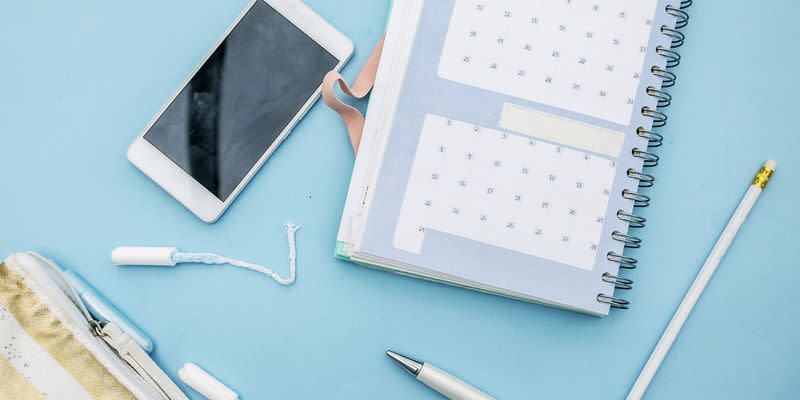All the surprising things you can learn about your body by tracking your cycle

Tracking your monthly cycle isn’t a new concept - women around the world have been doing it for years to help them conceive - but there are more benefits than solely knowing when your period is coming. Period tracker apps like Clue, Natural Cycles and Flo have seen a huge surge in popularity in recent years, and they do far more than just tell you
In fact, tracking your cycle could be the best way to inform you of your own little irregularities - such as why you always crave crisps on the second week of your cycle - or even more serious underlying health symptoms. Here's what you could learn:
It tells you what’s regular for YOU
Of course, the main reason to track your cycle is to know when your period is coming - but being aware of this also helps you stay informed of your bodily changes. “Tracking your period is key to helping you feel in control of your menstrual health and in turn, your overall health,” a spokesperson from female health app Clue told Cosmopolitan. ”While the global average for a cycle is 29 days, it might not apply to you and your cycles might be shorter or longer. Tracking your period helps you know what’s normal for you.”
It can help you understand your overall wellbeing
One of those extra benefits is knowing what’s normal for your moods. We’ve all felt low for a couple of days, only to finally understand why when our period arrives - but tracking can take away that confusion. “Your menstrual cycle is a direct indicator of your overall health,” says Clue. “Not only can your period affect your hair, skin and daily beauty regime, it can affect your energy levels, mood, food cravings and exercise habits.
"Perhaps most importantly, irregularities in your cycle, noticeable by tracking your cycle over a number of months, may suggest underlying health conditions, such as polycystic ovary syndrome or endometriosis.”
It can explain a lot about your sex drive
“Tracking your sex drive alongside your period can help your determine patterns in your cycle and hormone levels. For example, some women notice that their sexual desire spikes around ovulation, decreasing shortly after ovulation is complete.

"Others report more satisfaction from an orgasm around ovulation, although more research is needed to prove this.”
It can help you tailor your exercise regime
You've probably noticed that you have better workout sessions at certain times of the month, and that spike in your energy could well be due to your periods. Knowing when these lifts and dips occur could result in a better training schedule. Win!
"Tracking your exercise along with your energy levels can help you better determine which days are optimal for training, and which days might be better suited to resting," say Clue. "Research has found that strength training during the first part of your cycle results in higher increases in muscle strength, compared to training in the second part of your cycle, after ovulation."

It could help your sleep cycle
Struggling to sleep? It could be down to your cycle, among other things.
"People who have premenstrual mood disorders are more likely to experience sleep disturbances like insomnia, hypersomnia, fatigue, and even disturbing dreams during the luteal phase (the second part of the menstrual cycle, from ovulation to the start of your period) which could be due to disruption in their circadian rhythms. As such, tracking your period could help you to identify how your sleep changes throughout your cycle, allowing you to plan your activities accordingly.
"It’s important to remember, though, that other life stages can also disrupt sleep. Pregnancy, postpartum, and premenopausal and menopausal symptoms can also impact a person’s ability to sleep."
It can help you understand your hunger/cravings
We all know the feeling of craving nothing but chocolate once our period arrives, but by tracking your entire cycle you might start to notice patterns like when you crave salty, comfort or even healthy food.
"Food cravings are common premenstrual and pregnancy symptoms," says Clue. There is also evidence that some people seek out comfort from junk foods during times of emotional distress. The luteal phase is shown to contribute to higher sweet cravings and there’s also some evidence for increased salt cravings during the luteal phase.
"There are also reports of increased cravings of starchy or calorically dense carbohydrates like bread and pizza during pregnancy and the premenstrual phase. And the most well-documented cycle-linked sweet craving is for chocolate before and during the period.

"However, the current research is overall inconclusive about cravings’ specific link to the cycle. Tracking cravings throughout your cycle may help you determine if cravings are part of your cycle pattern. Tracking may also help you identify other triggers for cravings, like stress."
Basically, spending two minutes before bed inputting your physical and emotional symptoms could help inform you of a lot of your bodily behaviours. Worth the effort.
Like this article? Sign up to our newsletter to get more articles like this delivered straight to your inbox.
You Might Also Like

